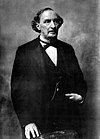1892 Argentine presidential election
| |||||||||||||||||||||||||||||||||
232 members of the Electoral College 117 votes needed to win | |||||||||||||||||||||||||||||||||
|---|---|---|---|---|---|---|---|---|---|---|---|---|---|---|---|---|---|---|---|---|---|---|---|---|---|---|---|---|---|---|---|---|---|
| |||||||||||||||||||||||||||||||||
| |||||||||||||||||||||||||||||||||
The Argentine presidential election of 1892 was held on 10 April to choose the president of Argentina. Luis Sáenz Peña was elected president.
Background[]
An 1888 massacre of a May Day gathering and an unprecedented financial crisis led to the formation of the first meaningful opposition to develop as reform movements in urban areas, culminating in the Revolution of the Park that forced Juárez Celman's 1890 resignation. These developments gathered speed when the Civic Youth Union became the Radical Civic Union (UCR), in 1891. Instability also prompted moderates from within the PAN to advance a diplomat, Roque Sáenz Peña, as the nominee. Roca foiled this move by persuading former Supreme Court Chief Justice Luis Sáenz Peña (Roque's father) to run – forcing the young reformist to withdraw. The UCR's appeal, for its part, helped lead President Carlos Pellegrini (who replaced the besieged Juárez Celman) to declare a state of siege a week before the 10 April 1892 elections. The resulting UCR electoral boycott left the ruling PAN as the only party on the ballot, handing its nominee the presidency unanimously.[1]
Results[]



| Argentine Republic | |
|---|---|
| Population | 3,858,000 |
| Voters | 77,200 |
| Turnout | 2% |
| Presidential Candidates | Party | Electoral Votes |
|---|---|---|
| Luis Sáenz Peña | National Autonomist Party | 210 |
| Bernardo de Irigoyen | Radical Civic Union | 5 |
| Bartolomé Mitre | National Civic Union | 5 |
| Julio Argentino Roca | National Autonomist Party | 1 |
| Total voters | 221 | |
| Did not vote | 11 | |
| Total | 232 | |
| Vice Presidential Candidates | Party | Electoral Votes |
|---|---|---|
| José Evaristo Uriburu | National Autonomist Party | 216 |
| Radical Civic Union | 5 | |
| Total voters | 221 | |
| Did not vote | 11 | |
| Total | 232 | |
Results by Province[]
| Province | President | Vice President | |||||
|---|---|---|---|---|---|---|---|
| Sáenz Peña | Irigoyen | Mitre | Roca | Uriburu | Garro | ||
| Buenos Aires City | 20 | 1 | 21 | ||||
| Buenos Aires | 33 | 33 | |||||
| Catamarca | 12 | 12 | |||||
| Córdoba | 26 | 26 | |||||
| Corrientes | 13 | 13 | |||||
| Entre Ríos | 17 | 17 | |||||
| Jujuy | 8 | 8 | |||||
| La Rioja | 8 | 8 | |||||
| Mendoza | 5 | 5 | 5 | 5 | |||
| Salta | 11 | 11 | |||||
| San Juan | 10 | 10 | |||||
| San Luis | 10 | 10 | |||||
| Santa Fe | 11 | 11 | |||||
| Santiago del Estero | 17 | 17 | |||||
| Tucumán | 9 | 5 | 14 | ||||
| Total | 210 | 5 | 5 | 1 | 216 | 5 | |
Notes[]
- ^ Todo Argentina: 1892 (in Spanish)
References[]
- Diario de Sesiones de la Cámara de Senadores - Periodo de 1892. Buenos Aires: Compañía Sud-Americana de Billetes de Banco. 1893. pp. 256–259.
- Duhalde, Eduardo Luis (2007). Acción Parlamentaria de John William Cooke. Buenos Aires: Colihue. p. 232. ISBN 978-950-563-460-6.
- Lazzari, Sofía (2014). El Vicepresidente: una figura conflictiva en el binomio presidencial (PDF). p. 37.
- "Historia Electoral Argentina (1912-2007), p. 58" (PDF). www.mininterior.gov.ar. Ministry of the Interior. December 2008. Archived from the original (PDF) on 8 September 2014. Retrieved 13 June 2017.
- 1892 elections in South America
- 1892 in Argentina
- Presidential elections in Argentina
- Elections in Argentina


